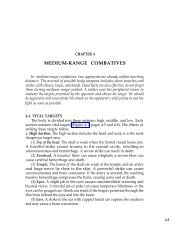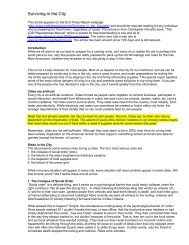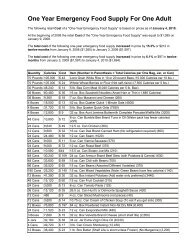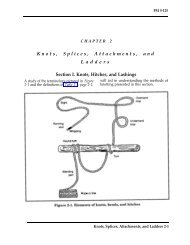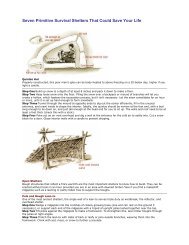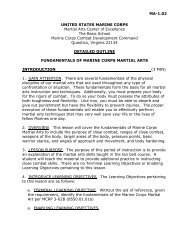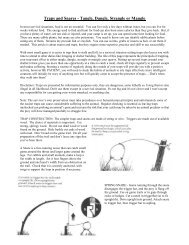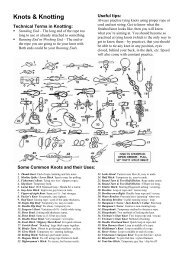Becoming Self-Sufficient for Six Months - Blog by Survival-Goods.com
Becoming Self-Sufficient for Six Months - Blog by Survival-Goods.com
Becoming Self-Sufficient for Six Months - Blog by Survival-Goods.com
Create successful ePaper yourself
Turn your PDF publications into a flip-book with our unique Google optimized e-Paper software.
will have to dig a latrine and build a privacy screen. Alternately, you could invest<br />
in a couple of self-contained camping toilets which could be used indoors.<br />
♦ Influenza will affect people in every profession, so you should assume that the<br />
police department, the fire department, and the local ambulance service will be<br />
understaffed and overwhelmed. Do not count on them to respond to your needs.<br />
♦ If your <strong>com</strong>munity lacks adequate staffing <strong>for</strong> law en<strong>for</strong>cement, you may wish to<br />
arm every member of your family and establish an armed neighborhood watch.<br />
♦ Be<strong>for</strong>e social conditions really deteriorate in your town, cover all of your first floor<br />
windows with security bars or plywood and post quarantine signs on your doors<br />
and walls. Buy the supplies now. If things begin to turn ugly (New Orleans style),<br />
consider placing an armed guard on the roof and sleeping in shifts.<br />
COOKING WITHOUT YOUR KITCHEN<br />
If you have no utilities and no way to prepare hot meals without the aid of your<br />
kitchen appliances, you may have to survive on cold, ready-to-eat foods. Initially, that<br />
may not prove to be much of a problem, but unless you have invested heavily in readyto-eat<br />
foods, you will eventually run out of things you can serve without cooking. For<br />
economic reasons, emergency food supplies are often built around large quantities of<br />
low-cost grain products that can tolerate long-term storage. These are items such as<br />
beans, oatmeal, pasta, lentils, split peas, wheat, and rice–all of which must be cooked.<br />
You may even discover that half of your emergency food calories are locked up in dry<br />
grain products. This should not present much of problem, however, because with a<br />
good camp stove and a decent supply of cooking fuel, you can avail yourself of all those<br />
grains and prepare hot food <strong>for</strong> every meal. Fortunately, cooking with camp stoves is<br />
cheap and easy, so there is really no excuse <strong>for</strong> serving cold food, even in a prolonged<br />
emergency situation. Here are some tips <strong>for</strong> cooking without modern appliances:<br />
♦ Acquire at least one camp stove that burns Coleman liquid fuel and a second stove<br />
that burns propane. Propane camp stoves are very safe <strong>for</strong> indoor cooking, but<br />
they cost a lot more to operate than liquid fuel stoves. Save the propane stove <strong>for</strong><br />
use when the weather is bad or when it is simply not safe to cook outdoors.<br />
♦ Some camp stoves are dual-fuel capable, which means they can burn both Coleman<br />
liquid fuel and regular unleaded gasoline. These stoves are inexpensive, so you<br />
might think about buying two or three and saving one <strong>for</strong> use as a back-up.<br />
♦ Measure the rate at which your stoves consume fuel, then acquire a 6 month supply<br />
<strong>for</strong> each one. Plan <strong>for</strong> an average of 20 minutes of cooking time <strong>for</strong> each meal.<br />
This rate of consumption will allow you to boil large kettles of pasta or beans.<br />
♦ If you can not find Coleman liquid fuel, you can still store enough cooking fuel <strong>for</strong><br />
a dual-fuel stove <strong>for</strong> months: fill up a couple of 5 gallon gas cans. A 10,000 BTU<br />
burner, operating <strong>for</strong> an hour each day, will only use about two gallons per month.<br />
♦ Although Coleman liquid fuel is highly refined and has chemical stabilizers <strong>for</strong><br />
long-term storage, you still need to rotate your stock to keep it fresh.<br />
♦ If you be<strong>com</strong>e sick, your family members will have to cook <strong>for</strong> you, so while conditions<br />
are still normal, be sure to have everyone be<strong>com</strong>e familiar with the stoves.<br />
Show them how to setup, light, cook, clean, re-fuel, and store each stove.<br />
♦ Have at least two manual can openers <strong>for</strong> all those canned goods.<br />
<strong>Be<strong>com</strong>ing</strong> <strong>Self</strong>-<strong>Sufficient</strong> <strong>for</strong> <strong>Six</strong> <strong>Months</strong> page 8




